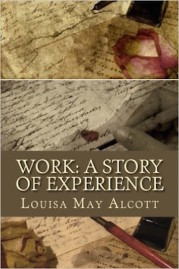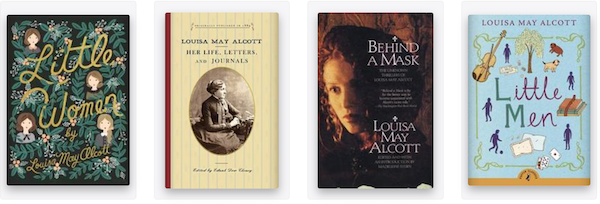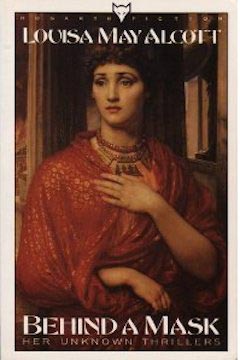Work: A Story of Experience by Louisa May Alcott (1873)
By Susan Bailey | On March 6, 2017 | Updated October 4, 2022 | Comments (0)

This article is part of a series of posts on Work A Story of Experience as found on the Louisa May Alcott is My Passion blog. To read all the posts associated with this book, explore this link.
“…Work is an expression of Alcott’s feminist principles and a major effort toward synthesizing in popular, readable form the broad set of beliefs encompassing family, education, suffrage, labor and the moral reform of social life that defined feminist ideology in the nineteenth century.” (from Critical Essays on Louisa May Alcott edited by Madeleine Stern)
So writes Sarah Elbert in the introduction to the 1977 edition of Work: A Story of Experience. Such beliefs had already been hinted at in Little Women and An Old-Fashioned Girl (most especially the latter). Now confident of her bully pulpit, Louisa put them forth in adult form using her life experience as the means.
Transcendental influence
According to Elbert, the influence of Transcendentalism with its belief in self-reliance and individual improvement as the means to a better society loomed large in Louisa’s brand of feminism.
This is most evident in the last chapter of the book, “Forty” where Louisa sends a lady of fashion, Bella Carroll, on a mission to educate her friends on leading a more purposeful life through deliberate conversation and reading (see previous post).
From the personal to the universal
In Work Louisa was able to fashion a personal search for meaning through a tale with universal appeal. Elbert points to the Reverend Theodore Parker, a radical preacher (see previous post) whose sermons, “The Public Function of Woman” and “Laborious Young Women” deeply inspired Louisa at a time when she was at her lowest point.
He became the Rev. Power in the story whose words, practical assistance and guidance led Christie from her despair into a new life full of purpose.
Christie Devon was a pioneer of sorts. As an orphan freed from taking care of aging parents, she opted for independence over marriage announcing to her Aunt Betsey that (taking words from the Seneca Falls Convention – Ibid, pg. 193) “there’s going to be a new Declaration of Independence.”
She then proceeded to knead her bread most vigorously, “kneading the dough as if it was her destiny, and she was shaping it to suit herself …” (Chapter 1, Work: A Story of Experience).
. . . . . . . . . .
 . . . . . . . . . .
. . . . . . . . . .
War brings change
Elbert saw this as a symbolic gesture marking a farewell to the rural way of life, a narrow way which for generations had so shaped a woman’s life. The Civil War had shaken society and the family to its foundations.
Because the men were called away, the women stepped up and took their places, as head of households and workers in the public sphere. (pg. 193 from Critical Essays on Louisa May Alcott).
Wages were seen as a path to independence but that path would be very hard. Christie, like most women, was trained in housewifery, a skill that was not valued in the workplace. She soon learned it was necessary for her to cultivate one skill.
Subtle humiliation in domestic service
The obvious place to start was domestic service. By all outward appearances, being a servant didn’t seem all that bad: the work place was in a fine home with many comfortable accoutrements.
It was not long before Christie saw the pitfalls: she was expected to serve the family with all the devotion and loyalty of a family member but without any of the benefits.
She was not even allowed to retain her own name. It was work meant to keep her in her place through endless and subtle humiliation, with the ultimate being her firing because her “fashionable” employer forgot herself in chastising her employee and couldn’t live with it.
. . . . . . . . .
How Louisa May Alcott’s Feminism Explains Her Timelessness
. . . . . . . . .
Evolving, and choosing to be true
In her search for meaningful employment, Christie went through a succession of jobs, from actress, to governess, to companion, to seamstress in a factory.
Christie grew quite talented as an actress and could have been successful. She felt, however, that the unwholesome temptations and vanities prevented her from being a true woman of character. Louisa had long dreamt of a life on the stage and through Christie she realized that dream only to have it fade when the consequences of that life proved too costly.
Undoubtedly Louisa also flirted with the unwholesome aspects of the stage, and she knew some success but not at the level that Christie enjoyed. In a sense, she used Christie’s experience to rationalize her own decision to leave the theatre.
Marriage — another option rejected
As a governess, Christie was tempted to “marry for a living” with Philip Fletcher thus securing a position in the world of fashion. It was the only alternative to low wage work or slavery. Louisa must remain true to herself and therefore so must her heroine, and Christie refuses his marriage proposal.
Elbert pointed out that marriage of this sort could only mean subordination and dependency; this surely was in opposition to the life Christie meant to live when she declared her independence from her Aunt Betsey. Again, she chose to walk away.
The need for friendship
Domestic service did not lend much opportunity for friendship. Christie did manage to maintain relations with Hepsey, a freed slave who worked with her as a servant, and chapter 20 demonstrated that she also kept in touch with Helen’s younger sister Bella whom she eventually sent out on a mission (see previous post). True friendship however did not come until she became a seamstress in a factory.
Her relationship with Rachel, a fallen woman trying to start her life over again proved both costly (she quit her seamstress job because Rachel was being fired because of her past sin) and life-giving (Rachel saved her from suicide). Rachel and Christie enjoyed a sisterhood that became formalized when it was revealed she was David’s long lost sister, Letty.
True womanhood at odds with working?
Elbert pointed out an interesting scenario created by Rachel’s presence at the factory. Hired because of her “superior” taste, she is subsequently fired when it is revealed that she had an affair. Elbert wrote,
“The respectable workshop manager must be intent not only on production but also on maintaining the legitimacy of such a system by hiring only girls of good character. In a dramatic confrontation between the necessities of production and the maintenance of social order, Rachel is fired as an undesirable influence on the workers, and the contractions between true womanhood and waged work are made explicit.” (Ibid, pg. 197).
. . . . . . . . .
Behind a Mask — the Unknown Thrillers of Louisa May Alcott
. . . . . . . . .
True to her friend and to the ideals of friendship
Christie’s response to the injustice and harsh judgment visited upon Rachel was swift with her own resignation. She offered to take Rachel in but Rachel insisted on leaving in order to redeem her life and be worthy of Christie’s friendship.
Again, Christie stood tall and walked away but her independent stand came at her own peril. Subsequent lack of work coupled with terrible isolation drove her to attempt suicide.
It was poetic on Louisa’s part to have Rachel reappear to be Christie’s savior, demonstrating that for the independent woman, a sisterhood was essential: a familiar theme in Little Women and in An Old-Fashioned Girl.
Elbert wrote, “Female friendships were doubly important to spinsters.” Louisa observed that “a brief but most sincere affection between two women was a viable experience which could open the heart to happiness that was its right.” (Ibid) Independence like anything else must be maintained in community.
Equality and love, short-lived
After her bout with despair, Christie met Cynthy Wilkins and through her, the Rev. Power. He sent Christie to the home of a Quaker woman, Mrs. Sterling, and her son, David whom Christie eventually married.
The romance between David (an idealized Thoreau according to Elbert) and Christie began with friendship, one of equality based on mutual interests, and evolved into a companionate marriage. The two served together in the Civil War as evidence of this equality but the marriage was cut short by David’s death.
While Louisa believed that a companionate marriage was possible, she didn’t believe it was for her; she could not realize it nor could she allow it for her alter ego.
David’s death released Christie back into the working world, a place where Louisa felt more secure (Ibid, pg. 200). Rather than simply live off of her husband’s pension, Christie developed his flower business and hired women like herself.
Her evolution is complete at forty, where, as a confident and independent woman comfortable in her own skin, she is able to share her experiences in a public forum, inspiring other women.
. . . . . . . . .
A Long Fatal Love Chase by Louisa May Alcott
. . . . . . . . .
The vibrancy of Work
Elbert concludes:
“Louisa May Alcott was a working woman all her life, moving through the experiences of domesticity, jobs, and unemployment.
Her awareness of these experiences as sharing women’s responses to the expectations raised by the dominant ideology of individualism enabled her to write more vividly and with a greater sense of urgency in Work than in any of her more commercially successful novels …
she was able to present both the common sensibility of women and their individual experiences in a way that exhibited the conflict of interests manifest in their lives …
The strength of her vision is revealed in the authenticity of Work; the facts of women’s lives in the mid-nineteenth century, as well as we can reconstruct them, are vivid and true in Alcott’s novel.” (Ibid, pgs. 200-201)
Work is Louisa’s feminist manifesto. To fully realize her potential, a woman needed autonomy but it cannot be realized in isolation. Through the strength of a circle of supportive and like-minded friends (a “sisterhood”), a woman could lead a satisfying and meaningful life whether or not she married. In this way, she could declare her independence.
Louisa lived her manifesto, albeit not without great difficulty, sharing her experiences in a provocative thinly veiled autobiography, Work. As a personal history of one woman’s journey to autonomy, Work serves as relevant story for today’s young women.
. . . . . . . . .
Contributed by Susan Bailey. Susan is a writer and lifelong student of Louisa May Alcott. She maintains the only blog devoted exclusively to Alcott, Louisa May Alcott is My Passion.


Leave a Reply